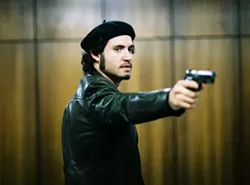Carlos
GRADE: B
As an epic chronicle of falling upward, this ambitious, breathlessly frantic and tightly wound film from Olivier Assayas (Summer Hours) is a fascinating depiction of how one man — Carlos the Jackal — turned a string of failed terrorist plots into larger-than-life notoriety. Or, at least, on the face of it, that's what Assayas' film — divided into three parts — seems to be about. Unfortunately, the talented French director mistakes slavish commitment to detailed, chronological history for drama, hamstringing what might have been a masterpiece of nihilistic cinema, narcissism and pop politics.
A thorough examination of Venezuelan revolutionary, terrorist and playboy-celebrity, Ilich Ramirez Sanchez (aka Carlos, given a fantastic portrayal here by Edgar Ramirez), the film chronicles the renowned terrorist's decade-long climb up the global terror ladder — and similarly long slide into irrelevance. Divided into three parts, the first two chapters are near-perfect, covering Carlos' ascent with brash energy, electrifying mise-en-scene and some sly critiques of the criminal persona.
Consumed with self-importance and bravado, Carlos is the perfect embodiment of the "me" generation, a vain and violent poseur who espouses radicalism and Palestinian zeal but holds no other commitment than to his own success. With his spirited embrace of clichés — because "there's always some truth to them" — and claims that he's a soldier not a martyr (and thus not expected to sacrifice), Assayas is sending up the crime-saga genre, making clear that while The Godfather and Goodfellas glorified the behavior of sociopaths, Carlos is out to emasculate its egotistical protagonist. We're given an intimate view of his globe-trotting lifestyle, meetings with international subversives and endless exploitation of nubile young beauties, and yet the film remains emotionally detached. It's a clever gambit than almost pays off.
Unfortunately, Carlos' final scattered installment loses steam, struggling to chart the last 10 years of the terrorist's fading charisma, influence and political relevance. Dutifully ticking off the events of his life as he evades authorities, Assayas lets rote history overtake thematic sophistication and character development, leaving the audience to wonder why five-and-a-half butt-numbing hours (it was made for French TV) needed to be invested in Sanchez's story.
While its plotting comes up short, Carlos never lacks scope. Covering 21 years, filmed in numerous countries, and scripted in four different languages, it's the kind of epic moviemaking Hollywood won't or can't afford to pursue anymore. As a purely cinematic experience, Assayas' film astounds, capturing the volatile politics and chic atmosphere of Europe in the '70s, bouncing from one exotic locale to the next, and slamming the audience into impeccably constructed action scenes — the second installment's hostage-taking raid at 1975's OPEC conference could stand on its own as a highly charged political thriller.
Unlike the recently released Mesrine or The Baader-Meinhof Complex, movies that also boasted an epic approach to contemporary history, Carlos doesn't rely on ironic stylization. Instead, Assayas tries to compose a serious essay on modern terrorism, one that links idealism to ego, and ambition to psychopathology. Had the internationally minded filmmaker unleashed his narrative from the this-then-that specifics of history, he might have found a more compelling way to reflect the self-serving insanity of geopolitical gamesmanship with the self-obsessed psyche of a man who was as much a puppet as he was a self-made celebrity.
Showing at the Detroit Film Theatre (inside the DIA, 5200 Woodward Ave., Detroit; 313-833-3237) at 7 p.m. on Friday and Saturday, Oct. 22-23, and at 2 p.m. on Sunday, Oct. 23.


